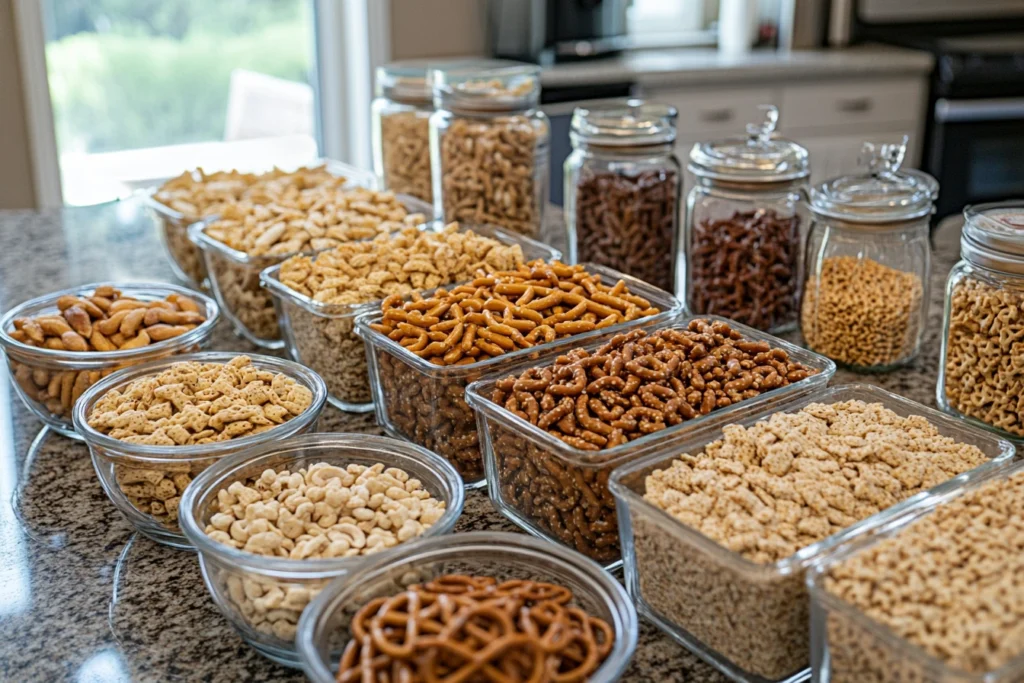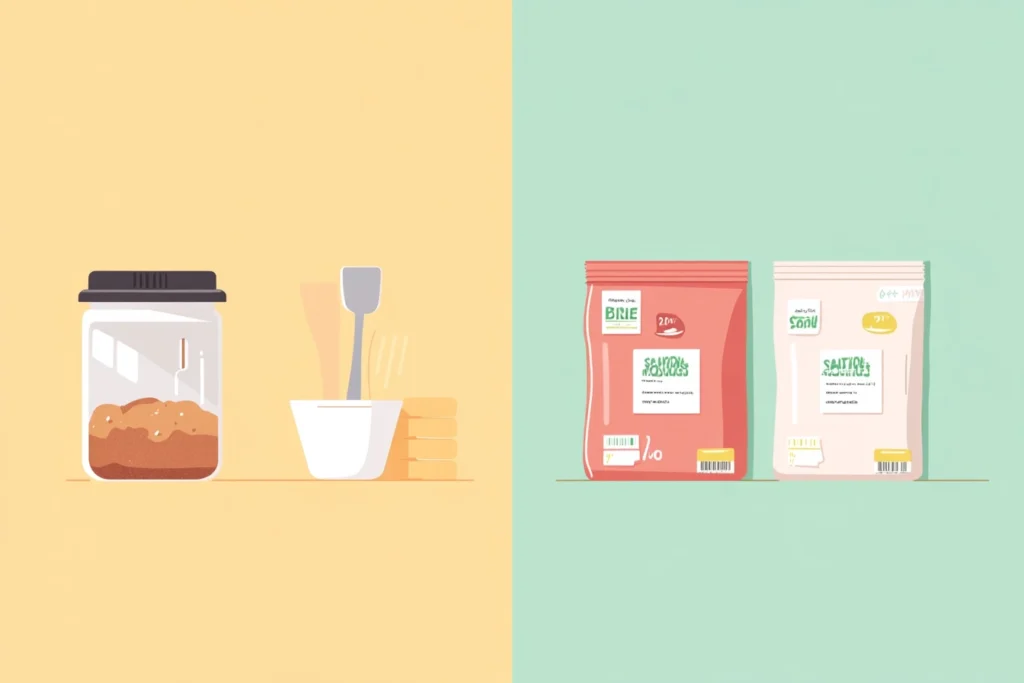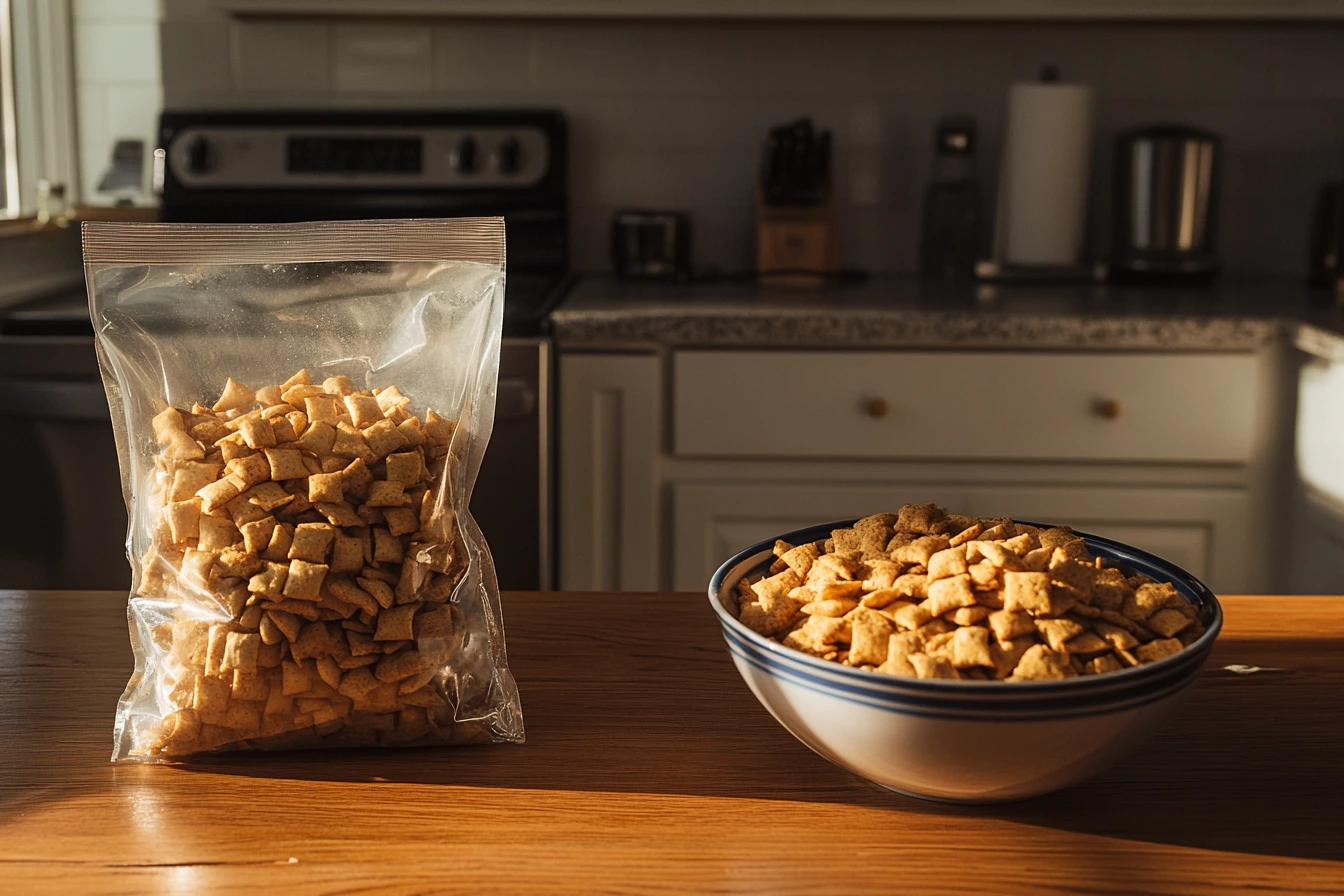Introduction
The relationship between cost and quality greatly influences decision-making in various fields. When considering whether it’s cheaper to buy or make Chex Mix, individuals and organizations must weigh these factors as they allocate resources, make purchases, and set priorities. Finding the right balance helps achieve goals in personal spending, business strategies, or broader economic decisions.
Why This Question Matters
Understanding this topic is crucial due to its impact on satisfaction and efficiency. For consumers, it determines whether they receive good value for their money. For businesses, it affects profitability, customer loyalty, and how they compete in the market. Addressing this issue helps people make informed choices, reducing overspending and avoiding underperformance. It aligns goals with available resources, ensuring more optimal outcomes.
Ditch Dinner Stress — Cook Smart, Not Hard 🍽️
35 quick & budget-friendly 5-ingredient dinners to save your evenings. Simple. Delicious. Ready in 30 minutes or less.
Factors to Consider: Cost vs. Quality
- Budget Constraints
Budget often dictates whether people can prioritize quality or need to find a compromise to stay within financial limits. - End-User Needs
High quality may be essential in some cases, while cost-effective options might suffice in others. - Longevity and Durability
Higher-quality options can save money over time by reducing the need for replacements or repairs. - Brand Reputation
Businesses often invest in quality to maintain a strong reputation, even if it means higher costs. - Market Competition
Companies must balance cost and quality to attract customers while remaining profitable. - Sustainability and Ethics
Environmentally friendly and socially responsible products often come at a higher cost but are increasingly valued by consumers.
By considering these factors, individuals and organizations can make choices that improve satisfaction, reduce waste, and promote long-term benefits.
Cost Breakdown of Store-Bought Chex Mix
Average Price of Prepackaged Chex Mix
Prepackaged Chex Mix is widely available in grocery stores, convenience stores, and online platforms. On average, the price per bag ranges from $3 to $5, depending on the brand, portion size, and location. This affordability makes it a convenient snack option for many consumers.
Price Variations by Brand
Different brands offer Chex Mix at varying price points. While leading brands like General Mills typically set standard prices, generic or store-brand options are often cheaper. Premium brands may charge higher prices, highlighting unique flavors or specialty ingredients as part of their appeal.
Regional Pricing Differences
Prices for prepackaged Chex Mix can differ based on location. Urban areas or regions with higher living costs might see increased prices due to overhead expenses and distribution costs. Conversely, rural areas may offer lower prices, although availability might be limited. Seasonal promotions or discounts also play a role in regional pricing differences.
What You Get for the Price
Portion Sizes and Packaging Options
Chex Mix is sold in various portion sizes, from single-serving bags to larger family-size options. Single-serving bags, typically priced under $2, are convenient for on-the-go snacking. Family-sized packages, costing around $5 or more, provide greater value per ounce, catering to group consumption or long-term use.
Ingredients and Quality in Prepackaged Mix
The quality and variety of ingredients in prepackaged Chex Mix vary by brand and flavor. Standard options include a mix of cereal pieces, pretzels, and other crunchy elements, often seasoned for added flavor. Premium versions may feature higher-quality ingredients or unique additions, such as nuts or specialty spices, which justify a higher price point.
Understanding these aspects of cost and value helps consumers make informed decisions when selecting store-bought Chex Mix for their needs and preferences.
Cost Breakdown of Homemade Chex Mix

Calculating the Cost of Ingredients
Chex Cereal (Rice, Corn, Wheat)
Chex cereal is the primary ingredient in homemade Chex Mix, and its cost depends on the type and brand. A standard box of Chex cereal, priced around $4–$6, typically provides enough for multiple batches. The choice of rice, corn, or wheat varieties may affect the flavor and overall cost.
Add-ins: Nuts, Pretzels, and Seasonings
Add-ins like nuts, pretzels, and seasonings can significantly influence the cost. A bag of pretzels costs approximately $2–$4, while nuts, such as peanuts, almonds, or cashews, can range from $6 to $10 per bag, depending on quality and quantity. Seasonings like garlic powder, onion powder, and salt are typically inexpensive, with small jars costing under $2 each.
Spices and Sauces
Special spices and sauces, such as Worcestershire sauce, hot sauce, or paprika, are integral to achieving the signature Chex Mix flavor. Worcestershire sauce costs around $3–$5 per bottle, and spices like paprika or cayenne pepper are similarly priced. These ingredients are often used in small quantities, making them cost-efficient over multiple uses.
Tools and Equipment: Are They a Factor?
Most households already own the tools and equipment needed to make Chex Mix, such as mixing bowls, baking sheets, and measuring utensils. However, for those who do not, the upfront investment in these tools could add to the initial cost. For instance, a basic set of baking sheets costs about $10–$20, and mixing bowls are priced similarly. These tools, once purchased, are reusable for various recipes.
Cost of Energy: Baking in the Oven
Baking homemade Chex Mix involves additional energy costs. The oven typically operates at 250°F (120°C) for about an hour. Depending on local energy rates, this could add $0.10 to $0.50 to the total cost per batch. While minimal, these energy costs are worth considering for those looking to keep expenses low.
Homemade Chex Mix offers flexibility in flavor and ingredient selection, often allowing for a cost-effective alternative to store-bought versions, especially when ingredients are purchased in bulk. However, upfront investments in tools or energy costs should be considered when calculating the overall expense.
Comparing Total Costs
Per Batch Comparison: Homemade vs. Store-Bought
When comparing costs per batch, homemade Chex Mix often has a higher upfront cost due to the need to purchase multiple ingredients. A standard homemade batch, made using common ingredients like Chex cereal, pretzels, nuts, and seasonings, typically costs around $10–$15, depending on ingredient choices. In contrast, a prepackaged store-bought bag of Chex Mix, suitable for individual consumption, costs between $3–$5. However, the homemade version yields a larger quantity, making it more economical for larger groups or long-term snacking.
Per Serving Cost Analysis
The cost per serving for homemade Chex Mix decreases significantly due to its larger batch size. For example, a homemade batch yielding 10 servings might cost $1.00–$1.50 per serving. Conversely, store-bought Chex Mix, often sold in smaller portions, typically costs $1.50–$2.00 per serving. This analysis highlights that homemade options provide more value per serving, especially for those consuming or sharing large quantities.
Is Homemade Always Cheaper? Exceptions and Variables
Homemade Chex Mix is not always the cheaper option. Several variables can affect the cost comparison:
- Ingredient Quality and Choices
Using premium ingredients like organic nuts, specialty spices, or gourmet add-ins can drive up the cost of homemade Chex Mix, potentially exceeding the price of store-bought options. - Batch Size and Waste
If a large batch of homemade Chex Mix is not fully consumed, the cost per serving increases due to waste. This can make store-bought bags more practical for individuals or small households. - Energy and Equipment Costs
Factoring in energy costs for baking and the potential need for tools or equipment can also make homemade Chex Mix less economical, particularly for those without well-stocked kitchens. - Time and Effort
While not a direct financial cost, the time and effort required to prepare homemade Chex Mix might outweigh its cost savings for some, making the convenience of store-bought versions more appealing.
In summary, homemade Chex Mix is often more cost-effective for larger quantities or group settings, but store-bought options may be preferable for convenience or smaller needs. The choice depends on individual preferences, consumption habits, and the importance placed on cost versus quality.
Other Factors to Consider Beyond Cost
Taste and Freshness
Homemade Chex Mix often stands out for its superior taste and freshness. Preparing it at home allows for freshly baked, perfectly seasoned mixes tailored to individual preferences. Store-bought versions, while convenient, may lack the same freshness and can sometimes have a slightly artificial taste due to preservatives or long shelf lives.
Customization Options
Homemade Chex Mix offers unparalleled flexibility. You can adjust the ingredients to cater to dietary restrictions, flavor preferences, or even creative experimentation. For example, you might add unique spices, switch out pretzels for crackers, or include extra nuts. Store-bought options are limited to preselected flavor combinations, which may not suit everyone’s tastes or dietary needs.
Health and Nutritional Benefits
Preparing Chex Mix at home gives you control over the nutritional profile. You can reduce sodium, avoid artificial additives, or use healthier alternatives like low-sodium pretzels or baked nuts. Store-bought Chex Mix, on the other hand, often contains higher levels of sodium, added sugars, and preservatives. For those seeking a healthier snack, homemade versions provide the opportunity to prioritize clean ingredients and balanced nutrition.
While cost is an important consideration, these additional factors can greatly influence the decision between homemade and store-bought Chex Mix, making homemade options appealing for those who value taste, personalization, and health.
Pros and Cons of Buying vs. Making

Pros of Store-Bought Chex Mix
- Convenience: Store-bought Chex Mix is ready-to-eat, saving time and effort.
- Consistency: Prepackaged mixes provide a predictable taste and quality.
- Portion Control: Smaller, pre-measured packages help avoid overeating.
- Availability: Widely available in stores and online, often with various flavor options.
Cons of Store-Bought Chex Mix
- Higher Cost Per Serving: Compared to homemade options, store-bought mixes often have a higher cost per serving.
- Limited Customization: Flavors and ingredient combinations are fixed, leaving little room for personalization.
- Preservatives and Additives: Some versions contain high sodium levels, artificial flavors, or preservatives that may not appeal to health-conscious consumers.
- Less Freshness: Long shelf lives may compromise freshness compared to homemade alternatives.
Pros of Homemade Chex Mix
- Customizable Ingredients: You can tailor ingredients and flavors to suit personal preferences, dietary needs, or creative ideas.
- Cost Efficiency: Homemade batches, especially larger ones, can be more affordable per serving.
- Healthier Options: It allows for control over sodium, sugar, and additives, making it a better choice for health-conscious individuals.
- Freshness: Freshly baked Chex Mix has a taste and texture unmatched by prepackaged options.
Cons of Homemade Chex Mix
- Time-Consuming: Preparing and baking homemade Chex Mix requires planning and effort.
- Upfront Costs: Buying all the necessary ingredients, particularly in small quantities, may be expensive initially.
- Waste Potential: Larger homemade batches may lead to waste if not consumed quickly.
- Energy and Equipment: Baking requires energy costs and the availability of tools, which might not be practical for everyone.
By weighing these pros and cons, individuals can decide whether the convenience of store-bought or the control and freshness of homemade Chex Mix better fits their needs and priorities.
Popular Opinions and Real-Life Comparisons
Feedback from Home Cooks
Many home cooks appreciate the control they have over homemade Chex Mix. They often highlight the ability to customize flavors and ingredients, citing this as a major advantage over store-bought options. Some mention the satisfaction of creating a snack tailored to their taste, such as adjusting spice levels or incorporating unique add-ins like dried fruits or specialty nuts. However, common complaints include the time required for preparation and cleanup, as well as the challenge of buying all the necessary ingredients for a single batch.
Home cooks also frequently note the freshness and superior taste of homemade Chex Mix. The aroma of freshly baked snacks and the absence of preservatives make the homemade version feel healthier and more indulgent.
Reviews from Chex Mix Buyers
Buyers of store-bought Chex Mix often emphasize its convenience and accessibility. Many praise the consistent flavor and texture, as well as the variety of flavors available, such as Bold Party Blend, Sweet and Salty, or Honey Nut. Store-bought options are especially favored for on-the-go snacking, quick party supplies, or situations where preparation time is limited.
On the downside, buyers sometimes criticize the smaller portion sizes, high sodium content, and the lack of freshness compared to homemade versions. Others mention dissatisfaction with the pricing, particularly for premium flavors or family-sized bags, which can feel expensive relative to the amount of product received.
These opinions underscore a clear divide between those who prioritize convenience and those who value customization, freshness, and control. Both groups have valid reasons for their preferences, making the decision largely dependent on individual needs and lifestyle.
Tips for Saving Money on Chex Mix
Finding Discounts on Prepackaged Mix
- Buy in Bulk: Purchase family-sized packages or multi-packs from wholesale clubs like Costco or Sam’s Club to reduce the cost per serving.
- Use Coupons and Promotions: Check for discounts through store apps, manufacturer websites, or couponing platforms. Seasonal sales, especially during holidays, often include snacks like Chex Mix.
- Shop at Discount Retailers: Stores like Aldi, Walmart, or dollar stores frequently sell prepackaged Chex Mix at lower prices than mainstream supermarkets.
- Opt for Store Brands: Many grocery chains offer their own versions of Chex Mix at a lower cost, providing similar flavors and quality.
- Sign Up for Rewards Programs: Joining loyalty programs or using cashback apps like Ibotta can lead to savings on prepackaged Chex Mix purchases.
Budget-Friendly Ingredients for Homemade Mix
- Buy Generic Brands: Opt for store-brand cereals, pretzels, and nuts, which are often significantly cheaper than name-brand versions.
- Purchase in Bulk: Shop for key ingredients like nuts and spices at bulk stores or online marketplaces to lower the cost per unit.
- Use What’s on Hand: Substitute ingredients you already have, such as leftover crackers, chips, or nuts, to avoid buying extra items.
- Simplify the Recipe: Stick to basic ingredients like cereal, pretzels, and a few seasonings instead of adding costly extras like premium nuts or specialty sauces.
- Shop Sales and Clearance: Look for discounts on baking staples like spices and sauces, especially during post-holiday markdowns when certain items are overstocked.
- Make Larger Batches: Preparing a bigger batch reduces the per-serving cost and ensures you get more value from your ingredients and energy usage.
By implementing these tips, you can enjoy Chex Mix, whether homemade or store-bought, without overspending, making it a more affordable snack for any occasion.
FAQs About Chex Mix Costs
How Long Does Homemade Chex Mix Last?
Homemade Chex Mix, when stored properly, can last up to two weeks. To maximize freshness, store it in an airtight container at room temperature. For longer storage, you can freeze it in a resealable freezer bag for up to three months. However, it’s best to consume it sooner for optimal taste and texture.
Can I Make Chex Mix Without an Oven?
Yes, you can make Chex Mix without an oven. A stovetop or microwave can be used as alternatives. For stovetop preparation, mix the ingredients and cook them in a large pan over low heat, stirring frequently to avoid burning. For the microwave, combine the ingredients in a microwave-safe bowl and heat in 1-minute intervals, stirring in between, until evenly toasted. Both methods save energy and may slightly reduce overall costs.
What Are Some Cost-Effective Add-ins?
Budget-friendly add-ins can enhance your homemade Chex Mix without increasing costs significantly. Consider options like:
- Popcorn: A lightweight and inexpensive filler that adds crunch.
- Salted Peanuts: Widely available and more affordable than specialty nuts.
- Pretzel Sticks or Mini Twists: Often available in bulk and relatively low-cost.
- Crackers or Breadsticks: Break up inexpensive crackers for added variety.
- Seeds: Sunflower or pumpkin seeds are cost-effective and nutrient-rich.
These options can help you stay within budget while adding variety to your Chex Mix.
Conclusion
Final Verdict: Which Option Saves Money?
When it comes to saving money, homemade Chex Mix generally provides better value, especially for larger batches or when ingredients are purchased in bulk. The cost per serving is often lower compared to store-bought options, and the ability to customize reduces the need to spend on unnecessary or undesired ingredients. However, for those with limited time, access to bulk ingredients, or the equipment to bake, store-bought Chex Mix may be a more practical choice despite its higher cost per serving.
Making the Best Choice for Your Needs
Choosing between homemade and store-bought Chex Mix ultimately depends on your priorities. If you value freshness, customization, and potential cost savings, making Chex Mix at home is the better option. On the other hand, if convenience, consistency, and time-saving are your top priorities, store-bought Chex Mix may be the more suitable choice.
By considering factors like batch size, ingredient costs, time investment, and your personal preferences, you can make an informed decision that fits both your budget and your needs. Whether you opt for the ease of prepackaged Chex Mix or the creativity of making it at home, the result is a tasty snack tailored to your situation.
Resources and Further Reading
For readers interested in exploring related topics, here are some resources and articles from our blog that delve deeper into cost-saving strategies, ingredient choices, and preparation tips:
- Why Soak Cucumbers in Salt Water for Better Salads: Discover simple yet effective techniques for enhancing freshness and flavor, applicable to snacks and beyond.
- The Secret to Perfect Cookies: Tips and Techniques: Learn how thoughtful ingredient selection and preparation methods can elevate your homemade recipes.
- The Ultimate Guide to Crafting the Perfect Sub in a Tub Recipe: A detailed guide to making cost-effective, customizable meals that inspire creativity.
- What Makes Tate’s Cookies So Good?: Explore the balance between quality and convenience in prepackaged goods, a discussion relevant to store-bought Chex Mix.
- How to Make Instant Pudding Creamier: Tips for enhancing store-bought mixes, offering parallels for elevating Chex Mix.
These articles provide additional tips, tricks, and perspectives for making smarter choices in the kitchen, whether you’re focused on saving money or perfecting your culinary skills.
